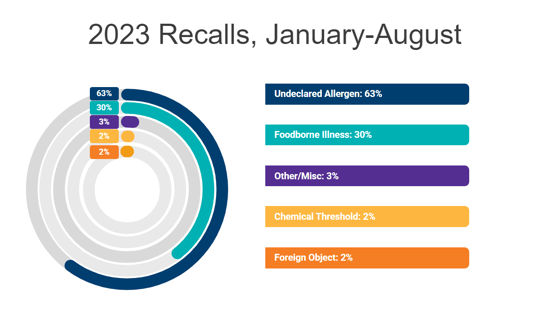In the Food and Drug Administration’s (FDA) New Era of Smarter Food Safety, leaning into modern solutions to improve food safety efforts is a major focus. And while Section 204 of the Food Safety Modernization Act (FSMA 204) has been in the spotlight this year, they are also bringing attention to other key areas, including modernizing recall events.
On September 29, 2023, the FDA held a public meeting with industry stakeholders across the United States to share their comments, concerns, and input around modernizing recall strategies for FDA-regulated products. The meeting, titled “Modernizing FDA Recalls Listening Session,” featured comments from two of Trustwell’s leaders: Chief Customer Officer, Katy Jones, on behalf of Trustwell, and our Vice President of Supply Chain Strategies and Insights, Julie McGill, on behalf of AIM North America.
Commenters were asked to focus on several elements, including strategies to reduce recall recurrence, ensuring efficiency and effectiveness of recall strategies, and strategies for public warning, including methods to reach underserved communities when recalls happen. The FDA will accept written public comments on the docket (FDA-2023-N-2393) until October 27, 2023. The four-hour recorded hybrid meeting event is also available to watch on the FDA’s website.
FDA Remarks on Modernizing Recalls
Opening up the session, the FDA shared how important it is to lean on the industry to better understand how regulations and technology can shape food safety solutions and protect consumers. Erik Mettler, Assistant Commissioner for Partnerships and Policy, opened the meeting with these remarks:
“Across the board, we (the FDA and the federal government) want to understand what activities are happening on the ground level and the impact of those activities at the end of the day. Recalls are an important part of the supply chain and is the last line of defense for consumers. What we really want to do is figure out how we can simplify the recall process. The purpose we’re here today is to look at the broad effort of recall processes in the industry… and how we can move forward with our recall activities.”
The meeting featured a panel of members across the FDA’s various offices and departments, and industry stakeholders across the spectrum shared their comments during the event to help the FDA shape future efforts on recall planning.
Rapid Response is Essential, But Requires Modern Solutions
Julie McGill shared her comments as the 21st speaker (you can watch her portion at the 2:04:30 mark) on behalf of AIM North America as the co-chair of the Food Supply Chain Work Group. AIM North America is a not-for-profit association that enables cooperation, development, and standardization of automatic identification and data capture (AIDC) technology. These technologies include barcodes, RFID, and ambient IoT, which have already begun to change how the industry traces products across the supply chain and identify lots for withdrawals.
Julie focused her comments on the technology already used within the industry and how stakeholders can build on this existing foundation.
“To see real change, we recognize the importance of standards, unique identification, data sharing, and interoperability. AIDC technologies enable automation, enhance accuracy, and increase efficiencies for recall operations. Modernizing recalls will require data gathering across our supply chains, like what has been set in the Drug Supply Chain Securities Act, Unique Device Identification, and FSMA 204.
 These regulations play a pivotal role in supply chain visibility and traceability by providing a framework of activities and defined data attributes, and we encourage the FDA to take this into consideration as you begin working on your recall modernization strategies. Industry stakeholders, solution providers, industry groups, and other supply chain partners are using terminology such as ‘Critical Tracking Events’ and ‘Key Data Elements’ in their businesses and solutions today. Let’s continue to build on this foundation.
These regulations play a pivotal role in supply chain visibility and traceability by providing a framework of activities and defined data attributes, and we encourage the FDA to take this into consideration as you begin working on your recall modernization strategies. Industry stakeholders, solution providers, industry groups, and other supply chain partners are using terminology such as ‘Critical Tracking Events’ and ‘Key Data Elements’ in their businesses and solutions today. Let’s continue to build on this foundation.
AIDC technologies enable users to attach unique identifiers to products, allowing for precise identification and isolation of affected items during a withdrawal or recall. This not only reduces the scope, but also minimizes disruptions to the supply chain and helps protect consumers from potentially harmful products. These solutions streamline communication between stakeholders by providing real-time data sharing, and with enhanced visibility, users have better data for recall notifications and updates. Modernizing recall technology allows us to put that data to use not only in our operations, but also out to consumer-facing platforms, such as mobile apps, automated text messaging, and social media to notify consumers quickly and effectively.”
Closing out her comments, Julie shared that the industry has access to these AIDC tools, but many in the industry have still neglected to adopt modern tools. And while change can be slow, not leaning into these recall solutions can ultimately lead to harmful or life-threatening events for consumers. She ended her comments with this: “By utilizing these systems and solutions, we have an opportunity to streamline operations, enhance communications, and protect public health. It’s time for industry to evolve and embrace recall modernization.”
A Growing Supply Chain Brings Challenges and Opportunities
Katy Jones was featured later in the lineup during the event (you can catch her remarks at the 4:19:55 mark). Katy’s remarks focused on the intricate web of connections through the supply chain, and the complexity of data sharing across stakeholders. She also focused on the importance of modern strategies for notifying consumers in the event of a recall, sharing:
“In this age of rapid technological advancement, our means of communication have evolved dramatically. However, our current recall system relies heavily on traditional methods, such as press releases and paper notices. These outdated approaches can result in significant delays in reaching consumers who need to be informed about potentially dangerous products. By modernizing recall technology, we can harness the power of digital platforms, social media, texting, and mobile apps to disseminate critical information rapidly and efficiently. This would help notify consumers, distributors, and retailers much more effectively, ensuring that tainted products are removed from the market swiftly.”
Katy also focused on the benefit of traceability technology to augment gaps in recall response. While FSMA 204 focuses primarily on tracing products across supply chains, many of the tools, language, and technology being developed to meet compliance can also apply to the FDA’s recall processes.
 “Enhanced traceability, supported by the upcoming FSMA 204 requirements, means we can pinpoint the source of contamination with precision and minimize the extent of recalls. This level of traceability not only aids in faster recalls but also minimizes unnecessary waste by pinpointing the affected products with accuracy.
“Enhanced traceability, supported by the upcoming FSMA 204 requirements, means we can pinpoint the source of contamination with precision and minimize the extent of recalls. This level of traceability not only aids in faster recalls but also minimizes unnecessary waste by pinpointing the affected products with accuracy.
Furthermore, modernizing recall technology is not just about reacting to contamination incidents; it's also about prevention. By employing data analytics and artificial intelligence backed by strong nutrition analysis and quality management systems, we can proactively identify potential risks in the food supply chain. This enables us to take preventive measures before a recall becomes necessary. This shift towards predictive analytics can save lives and protect public health.”
In her position as Chief Customer Officer, Katy is also closely familiar with the impact Trustwell’s technology has had on recall efforts. She shared with the panel that Trustwell’s FoodLogiQ Recall has helped customers reduce the time to execute a withdrawal by over 70%. In other words, what once took days now only takes customers a few hours to complete – ensuring a more rapid response that can protect consumer health.
Katy ended her comments with a personal message:
“Lastly, I speak today not just as an advocate for food technology but as a mom. Undeclared allergens made up the largest percentage of US recalls overall in the last 18 months, making up 47% of all recalls in 2022 and 63% of recalls in 2023, so far. And for my son, who suffers from a life-threatening tree nut allergy, the speed in which food companies are able to communicate and fully resolve a recall due to an undeclared allergen is paramount.”

Just as our food supply chain has evolved rapidly in the past few years, so must our response system to recalls. Katy, Julie, and many others at the FDA’s public meeting shared the importance of harnessing technology, and the challenges that can be solved through advanced, tech-enabled solutions.
Building a Better, Safer Future for Recalls
The FDA is continuing to accept comments on this measure until October 27, 2023. If you have concerns, questions, or comments that you would like to share with the FDA, you can do so on the Federal Register page for this docket. Once the FDA has closed the comment period, they will begin compiling information on how they can shape future recall policies and regulations.
At Trustwell, we understand the importance of rapid recall response and protecting consumer health is closely tied to our mission of changing the food industry for the better. To learn more about our FoodLogiQ Recall solution, or any of our suite of food safety, labeling, and compliance products, reach out today to schedule a custom demo with our team.
Other posts you might be interested in
View All Posts
Food Industry
6 min read
| September 29, 2023
Hear from an FDA Senior Consumer Safety Officer on FSMA 204 at reCONNECT 2023
Read More
Industry Regulations
10 min read
| March 13, 2020
The FDA's Leafy Greens Action Plan
Read More
Food Industry
24 min read
| April 30, 2024

